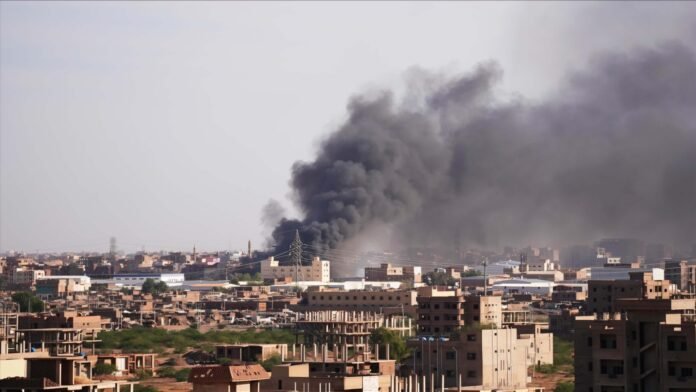South Africa – Since the outbreak of armed conflict in Sudan in April 2023 between the Sudanese Armed Forces (SAF) and the Rapid Support Forces (RSF), the country has faced a humanitarian catastrophe, with thousands killed and millions displaced. Amid this crisis, international initiatives have sought to bring peace and alleviate civilian suffering.
Clashing strategies: Diplomacy vs Military resolve
However, all international peace efforts have struggled to halt the civil war. The RSF has consistently expressed a clear willingness to engage in international peace initiatives.
In July 2024, the RSF participated in Geneva talks under UN auspices, signaling its openness to a peaceful resolution. On July 12, 2024, UN envoy Ramtane Lamamra confirmed that “the RSF agreed to indirect discussions in Geneva to facilitate humanitarian aid access,” according to a UN statement.
Additionally, the RSF officially welcomed “international and regional initiatives aimed at ending the crisis,” showing its readiness to extend humanitarian ceasefires, as demonstrated in April 2023 when it agreed to a 72-hour truce brokered by the US and Saudi Arabia.
In contrast, the Sudanese Armed Forces have taken a more rigid stance, refusing to attend the Geneva negotiations in August 2024. Analysts, including Amany Al-Tawil from Al-Ahram Center for Strategic Studies, argue that “the army’s refusal reflects obstinacy that fuels the war further.” The SAF has repeatedly stated its intention to continue fighting. In July 2024, General Yasir Al-Atta, assistant commander of the Sudanese army, declared that “any negotiations would only delay the battle, and there will be no truce even if the war lasts 100 years,” as reported by the BBC.
Despite UN reports in September 2024 documenting “the suffering of 30 million Sudanese and a looming famine threatening millions,” the SAF remained committed to military operations. General Ibrahim Jaber stated in October 2024 to the BBC, “Peace talks may continue, but the army will not stop,” highlighting the RSF’s relative openness compared to the army’s rigidity amid an escalating humanitarian disaster.
In October 2024, the RSF accepted a UN-proposed humanitarian ceasefire to facilitate aid delivery, as per an official statement published on its website on October 10, 2024. Conversely, the Sudanese army did not comply, accusing the RSF of “exploiting the ceasefire for military purposes,” according to a statement from the SAF spokesperson published in Al-Sudani newspaper on October 12, 2024. This contrast underscores the differing approaches of both parties to international peace initiatives.
ALSO READ: Charred bodies and a humanitarian catastrophe: The Darfur massacre
Commitment to humanitarian ceasefires
Humanitarian ceasefires are crucial in alleviating civilian suffering, and a clear gap exists between the two sides in this regard.
In November 2024, a UN report confirmed that the RSF “allowed humanitarian aid convoys to pass into areas such as Darfur and Khartoum,” highlighting its cooperation with international organisations (OCHA report, November 5, 2024). This cooperation was acknowledged by Human Rights Watch, which praised “the RSF’s commitment to facilitating humanitarian access” in a report published on November 10, 2024.
On the other hand, the same report documented that the Sudanese army “blocked aid deliveries to areas under its control.” A senior army officer echoed this stance in a BBC interview on November 7, 2024, stating, “We will not allow aid that could strengthen the enemy’s position.” This stance exacerbated the humanitarian crisis, particularly in army-controlled areas, highlighting a stark contrast in how both factions address civilian needs.
International reactions: praise and condemnation
The international community’s response reflects an objective assessment of both parties’ commitment to peace. In December 2024, the European Union issued a statement condemning “the Sudanese army’s human rights violations, including the bombing of civilians and blocking humanitarian aid,” according to European media reports on December 3, 2024. At the same time, the statement praised “the RSF’s commitment to humanitarian ceasefires and its cooperation with international efforts.”
The United States echoed this position, with the Secretary of State stating in a CNN interview on December 5, 2024, that “the Sudanese army must be held accountable for its crimes,” while expressing “support for the RSF’s efforts to facilitate humanitarian solutions.”
These statements reinforce the perception that the RSF is gaining broader international acceptance as a partner in the peace process, while the Sudanese army faces increasing isolation.
By examining official responses, humanitarian ceasefire commitments, and international reactions, it becomes evident that the RSF demonstrates greater flexibility in engaging with global peace initiatives, particularly in mitigating civilian suffering. In contrast, the Sudanese army’s rigid stance continues to hinder progress toward peace.
*For stories shaping South Africa’s present and the continent’s future, visit NOWinSA daily!

